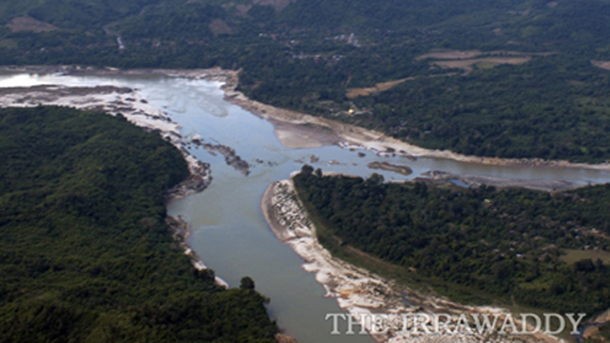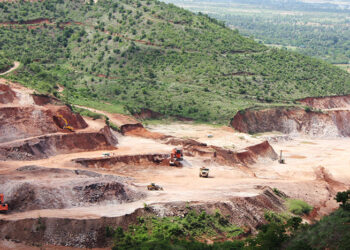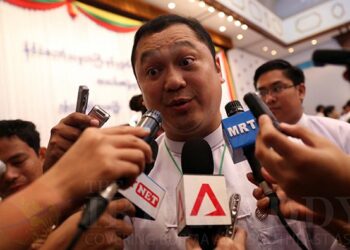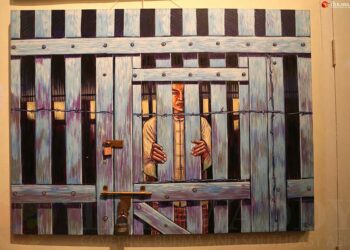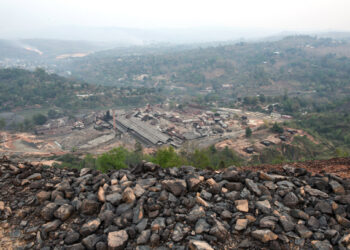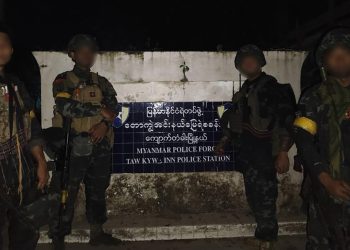A leading member of the Kachin Independence Army (KIA) has refuted allegations that the ethnic militia contacted a Chinese hydropower investor for kickbacks.
Speaking to The Irrawaddy on Thursday, KIA Vice Chief of Staff Gen. S. Gun Maw denied that any letter had been sent to China Power Investment Corp (CPI) requesting profit-sharing on the Myitsone Dam construction project.
An article in the Chinese edition of Bloomberg Businessweek earlier this month quoted the general manager of CPI’s Yunnan provincial branch, Li Guanghua, as saying that the KIA had requested in a letter to “hold talks to discuss the distribution of interests” at an initial stage of the project.
“After consideration, the letter was thrown into the dustbin,” Li was quoted as saying.
In another recent article, in the Chinese daily Economic Observer, Qin Hui, a historian at Beijing’s renowned Tsinghua University, also alleged that KIA and its political wing, the Kachin Independence Organisation (KIO), had attempted to cooperate with Chinese investors on the hydropower project.
“In fact, it was the KIO that first attracted Chinese investors to the region’s hydropower potential,” Qin wrote. However, “certain Chinese companies … cast the KIO aside, causing the angry separatists to change their stance on several projects.”
Yet, Qin wrote, even though the KIO was keen to work with Chinese investors, it had always opposed the Myitsone project, comparing its symbolic position for the Kachin people to that of Mount Fuji in Japan or Mount Kumgang in North Korea.
Qin concluded that as hostility against the Chinese investors increased in the area, so too did the public’s level of support for the KIA/KIO.
The Myitsone Dam was scheduled to be constructed at the Myitsone confluence of the Mali and N’mai rivers, and would have come to be the country’s largest hydropower dam, flooding an area roughly the size of Singapore. Some 90 percent of its energy output was earmarked to go to China in the first 50 years of its operation.
However, Burma’s President Thein Sein suspended the US $3.6 billion-dollar project in September last year after a public outcry over its environmental impact. It is understood that the project is a joint venture between CPI and Burmese magnate Steven Law’s Asia World Company Ltd.
Li Guanghua’s comments to Bloomberg Businessweek provided fresh insight on how CPI became involved in the multi-billion-dollar megadam construction project.
He said that in 2006 a Burmese government official travelled to Kunming, Yunnan’s provincial capital, seeking Chinese investors for hydropower projects in Burma, and eventually approached CPI.
CPI thus became the only Chinese hydropower investor in Burma, and Li recalled shuttling between Kunming, Beijing and Naypyidaw to settle the deal.
He said that now there were more than 10 Chinese companies investing in hydropower in Burma. “Our company is in China, our business is in Burma, our competitors are all Chinese investors, the competition is fierce,” Li said to Chinese journalist Yang Meng who was permitted by CPI to visit the Myitsone Dam’s construction site last month.
Yang subsequently reported that of the originally dispatched 2,000 Chinese workers for the initial phase of the dam’s construction, only 200 were left. He described the construction site as deserted and said equipment worth 700 million yuan (US $100 million) was left rotting in the humid heat. “We have become a victim of politics,” one CPI worker was quoted as saying.
Yang said that bringing supplies from the Yunnan border town of Tengchong solved the initial scarcity of supplies. With telephone lines brought over from the border town, even the dial code for landlines at the construction site is that of Tengchong, he said.
Yang’s article in Bloomberg further went on to describe how the Chinese journalist joined CPI staff on Feb. 23 at their office in Myitkyina to listen to a campaign speech by Aung San Suu Kyi on the radio. At the end of the speech, he wrote, he heard a long sigh of relief among the staff, because Suu Kyi had not mentioned the dam project.
CPI has since been lobbying within China for the continuation of the Myitsone project.
Lobbyist and Deputy Secretary General of the China Society for Hydropower Engineering Zhang Boting has published several articles in Chinese national newspapers, including the People’s Daily, arguing for a resumption of the project.
Burma “is expected to lift the suspension of the dam project, and the state government of Kachin should give its support,” he told the Hong Kong-based South China Morning Post on Thursday.
Last month, the chief scientist at Nature Conservancy’s China program, Long Yongcheng, met with CPI representatives in Kunming, the South China Morning Post also reported.
Long reportedly said that CPI representatives had expressed concern over extensive logging in the vicinity of the Myitsone river confluence, which would increase the amount of silt in the rivers’ waters and could even lead to landslides potentially damaging the future dam.
CPI was considering establishing a fund capitalized with five to 15 percent of the total investment value to provide business alternatives for locals engaged in logging, the environmentalist told the Hong Kong daily.
Burma’s largest hydropower project is currently the Yeywa Dam on the Myitnge River in Mandalay Division. It was handed over to Burmese operators by a Chinese construction consortium on Thursday, Chinese national television reported.
Construction of the 790-MW dam had been completed in December, six months ahead of schedule. A consortium of Swiss and British engineers, but mostly Chinese state-owned enterprises, were responsible for the $700-million hydropower project.
But it is the Myitsone project that continues to raise temperatures across Burma with prominent activists and environmentalists saying that it would cause profound damage to the Irrawaddy River—the source of livelihood to millions of Burmese.
The suspension of the project by Thein Sein was greeted with acclaim at home and abroad, and has been seen by many critics as the most concrete move by Naypyidaw to prove to the world that it is reforming.
However, several observers and local NGOs have voiced concerns that the project has not, in fact, been suspended, citing movements of Burmese army troops into the area, the retention of the Chinese workforce at the site, and the continued displacement of local villagers.


